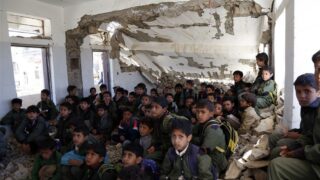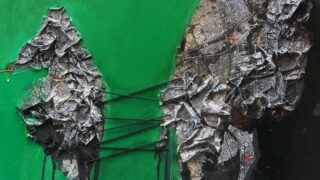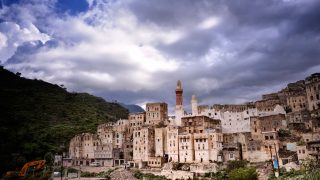When in Yemen, you cannot help but laugh when a Lebanese friend asks you if you are "fasting" during the month of Ramadan. Everybody fasts during Ramadan in Yemen, including non-religious people, who make sure to let it be known to the public. In any case, no restaurant or cafe receives visitors during Ramadan. Only children as young as the age of 10 can rebel against the situation.
In Yemen, fasting is the only thing that breaks the monopoly of the majority. During Ramadan, the poor are no longer the only ones to voice their hunger. However, they endure another form of inequality and discrimination at the hands of the rich who feel tense because of "fasting."
During the month of Ramadan, the country's corrupt looters head to Saudi Arabia to perform umrah, or a pilgrimage to Mecca. While some perform a religious pilgrimage in Mecca, others undertake a political one in Riyadh. They come back after having rid themselves from the guilt over their behavior throughout the year. They boldly talk to the oppressed population about their spiritual experience in Mecca, purging themselves of the corruption, oppression and plunder of public money they have been undertaking throughout the year. As my friend says, "devils are not chained up" during Ramadan, as long at the members of the National Dialogue Conference continue to work during this month.
This is the atmosphere of Ramadan in most of Yemen's major cities. In Sanaa, children have not so long ago started burning car tires in celebration of the coming of Ramadan, only to fill the sky with dark smoke. Perhaps it is the same with politicians who try to burn their sins away during the seasonal umrah. Burning tires is something new in Yemen. Yemenis usually respect each others' feelings and do not behave with such frivolity.
Tires have never accumulated in the cities' streets until recently, following the abundant number of modern cars. It seems that burning tires is exclusive to urban children, as it is not a tradition in Yemeni villages.
However, what is less disturbing than the environmental pollution and political and sectarian corruption, is the suffocating shopping-related traffic plaguing Sanaa before Ramadan. People in the city deal with Ramadan as a sudden military coup rather than an annual occasion, although they may plan ahead to shop for Ramadan goods and spare the city its current paralysis.
For me, Ramadan is the time of the year that I feel most at harmony with Yemen, as the night becomes day and day becomes night, whether in normal or official life. This fits my lazy lifestyle, especially in the morning, and spares me from dealing with the large amounts of food offered to me by my female relatives visiting during the day, complaining about my gaunt figure and forcing me to eat. This is something I do not tolerate, as I am not interested in daily meals, except to the extent to fill my hunger. I am usually satisfied with one meal a day.
I was in the 5th grade when I fasted for the first time. I used to live with my very religious uncle. He would reprimand me — despite my young age — for not being able to fast like other boys my age due to my emaciated body. I fasted that day to prove him wrong.
I do not remember many details, except that at 3 p.m. I vomited a yellow substance. Later on I understood that this was due to hunger and mental fatigue. The next day, when my uncle asked me if I was going to fast for Ramadan, I innocently replied that I would fast until noon, and that the next day I would fast from noon until the sun set. He laughed hard. In response to his laugh I asked him if he could wear the clothes of my father who is taller than him, and his reply was negative. I told him that he had to shorten the clothes if he wanted to wear them, as was the case with my attempts at fasting. I had to shorten the period according to the requirements of my body and age. In all cases, the proposal, which I thought was logical and had spent the whole night preparing, did not please my uncle.
The invitations for the iftar meal proliferate during Ramadan. Each day, I have to apologize for not being able to attend three genuine invitations at least, to be able to attend a fourth. No one asks you over for suhour — the meal consumed early in the morning — which is deemed essential and more important than iftar if one takes into consideration the long hours of abstention from food. This is related to the religious culture that rewards those who offer iftar as much as the fasting people, even if the food offered is nothing but a date. The iftar is like lunch during normal days, a time during which Yemenis invite each other over. Yemenis do not gather for dinner like they do in other countries.
Sitting at the table for iftar, we were waiting for the afternoon prayer time. I did not really take notice that Islamists were present. As we held the dates in our hands and carefully waited for the sound of prayer — the most beautiful sound to be heard in Yemen during Ramadan — one Islamist told the others in a fierce tone, “Pray for Syria.” I asked cheekily, “For whom in Syria? The Free Syrian Army or the regime’s army?” Everybody looked at me. I realized how wrong it was for me to ask such questions, so I calmly corrected the mistake by saying, “God grant Syria victory,” without adding anything else. I felt how strangers like me grow uneasy with the looks of those around them, while unspoken, they do not forgive the slips of the tongue that have been endlessly mentioned in Arabic adages. I found myself yet another person who feels sorry for the silent dates that are subject to hungry looks waiting to feast upon them. What if I was the date of that moment?
During Ramadan, few habits in Yemen are related to the spiritual behaviors of fasting and the rest is, of course, related to politics, religious affiliations and the suppression of those who are forced to go hungry throughout the year. The poor are less vigilant in fighting for what life has to offer and are more at peace with fasting. They have an intimate relationship with hunger for the other 11 months of the year. Yet, Ramadan’s hunger is an act of worship to them.
In my village, Ramadan is the month closest to the soul and the dearest to the heavens. I cannot understand Ramadan in Sanaa, or in any place, or feel its intimacy that I can perceive in the twilight of the western hill as it sends the last rays of sun into the Red Sea. I hear the voice of the reciter on Sanaa Radio and watch my mother as she prepares the shafout meal that reminds me most of the warmth of family and is lightest on an empty stomach.
The tarawih, or the special prayers said during Ramadan, in the village’s mosques are a fascinating ritual that is not tainted by politics, sects or feigned reverence like in the cities that have no soul and are ornamented with pretentiousness. Islam in Yemen is rural par excellence, as is Ramadan.
Translated by Al-Monitor




